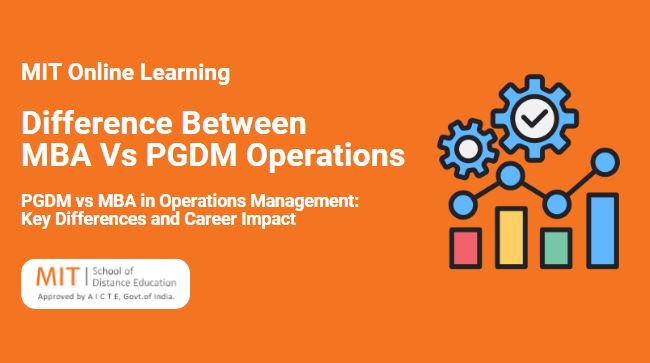
Choosing between an MBA in Operations Management and a PGDM in Operations can be a difficult decision, especially when considering the competitive features and long-term impact on one’s career.
In today’s blog, we’ll explore how to make the right decision between the two.
Definitions & Purpose
MBA in Operations Management
An MBA in Operations Management is a postgraduate business degree that focuses on the principles and practices of managing the day-to-day operations of a business, including production, supply chain, and logistics. It equips individuals with the skills and knowledge needed to optimize processes, improve efficiency, and manage resources effectively.
PGDM in Operations
A Post Graduate Diploma in Management (PGDM) with a specialization in Operations Management focuses on developing the skills and knowledge required to efficiently manage business processes, supply chains, and resource allocation within organizations. It includes areas such as supply chain management, operations strategy, quality management, and logistics.
Key Features
MBA in Operations Management
- Supply Chain Management: Understanding the flow of goods and services from suppliers to customers, including logistics, warehousing, and transportation.
- Quality Management: Ensuring products and services meet industry standards and customer expectations, using techniques like Six Sigma and TQM.
- Project Management: Planning, executing, and managing projects effectively, including resource allocation, timelines, and risk mitigation.
- Logistics: Managing the movement and storage of goods, including transportation, warehousing, and inventory control.
PGDM in Operations
- Focus on practical application: Emphasizes real-world learning through case studies, live projects, and industry exposure.
- Comprehensive curriculum: Covers various aspects of operations management, such as supply chain, logistics, operations planning, and project management.
- Skill development: Helps build analytical, decision-making, and communication skills essential for success.
- Career opportunities: Opens diverse paths in both manufacturing and services — from supply chain specialist to operations manager.

Admission Eligibility Criteria
MBA in Operations Management
- Bachelor’s Degree from a recognized university in any discipline.
- Minimum Marks: Usually 50% or equivalent CGPA.
- Entrance Exams: CAT, MAT, XAT, GMAT, or university-specific tests.
- Work Experience: Required for some executive MBA in operations management for working professionals.
PGDM in Operations
- A graduate degree with at least 50% marks (45% for reserved categories).
- Accepts entrance scores from CAT, MAT, XAT, ATMA, CMAT, GMAT, MH-CET, or AMAT.
- Work experience may be preferred for executive PGDMs.
Benefits
MBA in Operations Management
- Increased earning potential
- Career advancement opportunities
- Valuable skills: Problem-solving, analytical thinking, leadership
- Enhanced employability
PGDM in Operations
- Better job prospects in manufacturing and services
- In-depth industry understanding
- Practical skill development
Fees
MBA in Operations Management Fees
Typically range from ₹1 lakh to ₹20 lakhs depending on the college.
PGDM in Operations Fees
Generally between ₹70,000 and ₹12.5 lakhs, with EMI and loan options available.

Curriculum
MBA in Operations Management typically includes:
- Operations Management: Production planning, capacity planning, quality control
- Supply Chain Management: Sourcing, transportation, distribution
- Project Management: Execution and control
- Quantitative Analysis: Forecasting, optimization
- Financial & Marketing Management: Budgeting, market research
- Business Policy & Strategy
PGDM in Operations includes:
- Production and Operations Management: Process analysis, lean manufacturing
- Supply Chain Management: Procurement, logistics, warehousing
- Quality Management: Six Sigma, TQM
- Business Analytics: Data-driven operations decisions
- Project Management: Product development and process improvements
- Technology in Operations: Industry 4.0, smart manufacturing
Comparison Table: MBA HR vs PGDM HR
Aspect | MBA in HR | PGDM in HR |
Program Type | Degree | Diploma |
Duration | 2 years | 1-2 years |
Recognition | University-affiliated, globally recognized | Industry-focused, globally relevant |
Curriculum | Fixed, often updated less frequently | Dynamic, regularly updated with trends |
Industry Exposure | Limited (depends on college) | High (internships, live projects, experts) |
Flexibility | Less flexible | More flexible (especially online PGDM in Operations) |
Practical Orientation | Moderate | High |
Target Audience | Fresh graduates, entry-level professionals | Freshers, working professionals, mid-senior level |
Global Acceptance | High | High (depends on accreditation) |
Cost | ₹1-20 Lakhs | ₹70K-12.5 Lakhs |
Why PGDM Might Be a Better Choice
While both MBA Operations and PGDM in Operations share similar learning outcomes, PGDM offers several unique benefits:
✅ Curriculum regularly updated as per industry trends
✅ Flexibility through distance MBA in Operations Management or online PGDM in Operations
✅ Global relevance with industry-recognized certifications
✅ Suitable for freshers as well as working professionals
PGDM in Operations Management at MITSDE
The PGDM in Operations Management at MITSDE is designed to empower students and professionals with skills to drive organizational efficiency. It blends academic knowledge with industry practices to make learners job-ready.
Course Benefits:
- Strong foundation in operations management courses
- Analytical tools for forecasting demand and supply
- Career planning across all stages
- Mastering key operations manager training techniques
- Exposure to international practices in IT operations and logistics
Learn more here: PGDM in Operations Management at MITSDE
Final Thoughts
When choosing between an MBA in Operations Management and a PGDM in Operations, consider your career goals, learning style, and need for flexibility.
While an MBA ops offers academic rigor, a PGDM in Operations—especially from a reputed institute like MITSDE—offers practical exposure, a dynamic curriculum, and industry alignment.
In today’s rapidly evolving business world, future-ready professionals prefer programs like online MBA operations management or operations management certification that match current job market demands.



